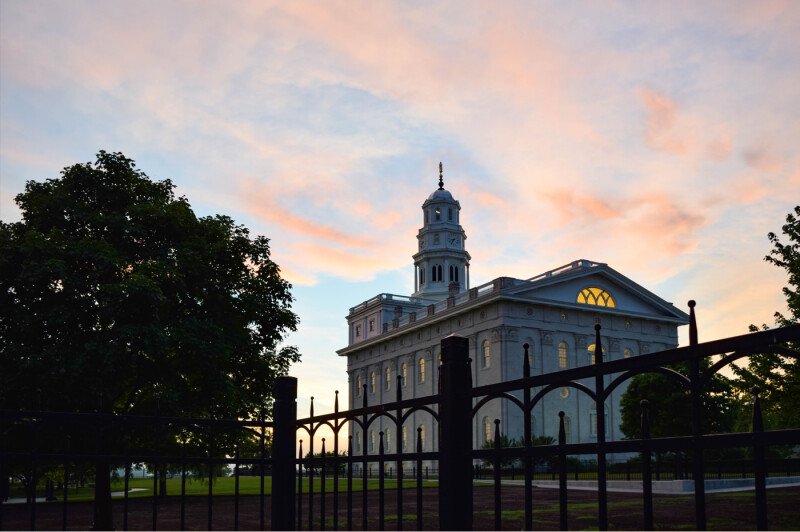Earlier this summer, I visited Nauvoo for our stake youth conference. I’d been there before and am familiar with what we often refer to as the “pioneer story.” But this trip was different. Fifteen years had passed since my last visit, and my life experiences had put me in a better position to relate to some of what the early pioneers went through. I came away with a better understanding of what the residents of Nauvoo might have experienced both living in—and leaving—their beloved city.
During our visit, we toured their homes and businesses; we learned how to dip candles, weave rugs, and bake bread. We played pioneer games and dressed up in pioneer clothes. We also watched talented performing missionaries sing, dance, and perform in a marching band, demonstrating the social activities the pioneers might have enjoyed. The impression I had as I participated in these events, was that the Saints were happy in Nauvoo. They had a good life. They had found refuge from previous storms and may have felt that they were being blessed for their obedience in following the Prophet Joseph Smith. They had done what they were asked to do and planned for a long and prosperous future in their beautiful city.
We know from Church history that the long and prosperous future the Saints had pictured for themselves in Nauvoo wasn’t meant to be. Tensions grew between the Saints and other residents in the area (including those who had initially welcomed them with open arms), and they were forced to leave. Lewis Barney, a Latter-day Saint living in Nauvoo at the time, wrote about his encounter with some of the men responsible for driving the Saints out of Nauvoo. “We know you are an honest man and we feel sorry for you,” they said. “If you will give up Mormonism and the Book of Mormon, you are welcome to stay with us and we will protect you. [Our] determination is to drive all the Mormons into Nauvoo then surround it and then burn the city and drive the Mormons into the river.” Barney responded that their plan sounded “very cruel” but he could not comply with their request to denounce his faith.
The majority of the Saints refused to deny their testimonies, so with only their faith in the Prophet and a love of their God, they “swept the floor and gently closed the door” to their beloved homes and headed west, leaving their hopes and dreams for that city behind. As Bathsheba W. Smith wrote, “My last act in that precious spot was to tidy the rooms, sweep up the floor, and set the broom in its accustomed place behind the door. Then with emotions in my heart … I gently closed the door and faced an unknown future, faced it with faith in God.”
As I imagined their happy life in Nauvoo, and the anguish they must have felt at leaving, I thought of the challenges many of us face today—of the times we must turn and walk away from the future we expected and worked for. I thought of the man who gives his best years to a company, believing in the promise of a promotion, only to be let go in a corporate buyout; the mom who gives her time, energy, and resources to her young kids, only to have them distance themselves from the family as adults; the couple who saves and plans for retirement and is then separated prematurely by death due to illness or accident; the family who dutifully follows the counsel of the prophet but loses a child to suicide; the woman facing a lifetime of chronic illness.
For most of us, life doesn’t go as we planned, in spite of our best efforts to make it so. But like the residents of Nauvoo, we can move forward with faith in the prophet and love for our God, expecting that He will guide and direct us to future blessings and deeper faith.
How can we exercise faith in the prophet and love for God to meet the challenges of our day? It’s not always easy. When my husband died unexpectedly at age 51, I found myself stuck in a pattern of looking back, much like Lot’s wife, Laman and Lemuel, and the children of Israel. I longed for the life I no longer had, while also feeling sad and disappointed about the unknown future I was facing. I consequently spent a lot of time and energy dwelling on what could no longer be.
▶ You may also like: The miracle didn’t come: What one widow is learning living out the ‘but if not’ scenario
My trip to Nauvoo reminded me of a simple truth I know I can hang on to: God has a plan and I can trust Him. And at the end of the day, this truth has the power to “quiet all my fears” and give me “strength beyond my own.”1 It reminds me that He knows the beginning from the end and that all things will work together for my good (Romans 8:28). My job is simply to invite Him into my story by giving Him my will and my time and trying each day to follow Him.2 This looks like consistently doing Come, Follow Me study, listening to uplifting Christian music, and being intentional about the type of media I consume. It looks like seeking out opportunities to serve others and remembering moments when I have seen God’s hand in my life. I focus on learning more about the character of Christ, and how I can access strength through His Atonement.
I still get overwhelmed by an uncertain future, and I long for the ease and comfort of the past. But like the pioneers, I look to the prophet for direction, and I pray daily for God to help me take the next right step.
As President Thomas S. Monson so beautifully said, “the future is as bright as your faith.”3 The pioneers believed this and so do I.
Notes
1. Hymn 136, “I Know that My Redeemer Lives.”
2. See Camille N. Johnson, “Invite Christ to Author Your Story.”
3. See Thomas S. Monson, “Be of Good Cheer.”


